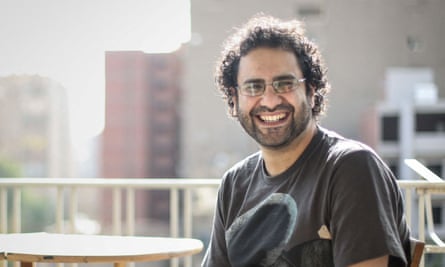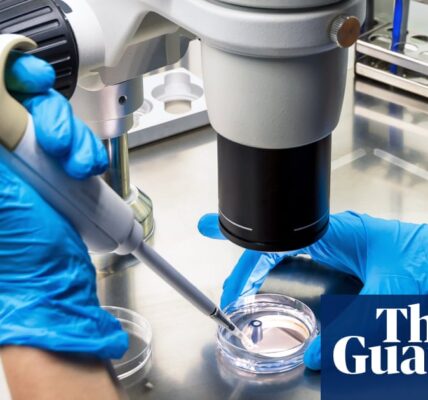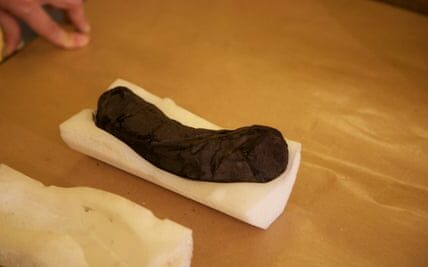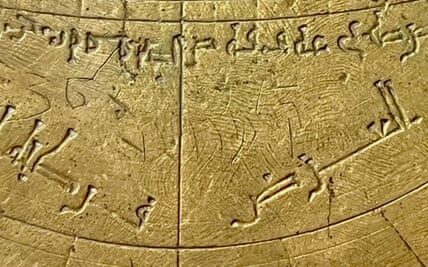T
I am familiar with the drive north from my family’s house in Cairo. It is the route to Alexandria, a trip I used to take often to go to the beaches on Egypt’s north coast. However, on November 17, 2022 – almost a year ago – the journey felt completely different. Although we were heading in the same direction, our destination this time was the prison where my older brother, Alaa Abd El-Fattah, is currently imprisoned. He is a well-known activist fighting for democracy in Egypt and has been in and out of jail for the past nine years. On the day of our visit, Alaa had been on a hunger strike for six days, in hopes of securing his release after 200 days of partial fasting. We were unsure of his condition when we arrived.
At 9am, my mother, aunt, and I loaded into a car and drove towards the modern prison complex located deep in the desert. We remained quiet during the ride as there was nothing to be said. Upon arriving at the compound, we were familiar with the routine: exit the car, show our documents to the officials, and then wait for hours on end. The wait that day felt particularly tense. A few days prior, our family had received two brief handwritten notes from Alaa, confirming that he was still alive. The first letter stated that he was able to drink water again. The second mentioned that he was also able to eat and requested a birthday cake for his upcoming 41st birthday, which would be celebrated during our visit.
For several hours, my mother and aunt were anxious about what kind of cake to bring, but I refused to participate. My main focus was on our failure to secure his release. Meanwhile, 500km away in Sharm el-Sheikh, world leaders were convening for Cop27, the annual United Nations climate conference. Thanks to the efforts of countless individuals, we were able to draw attention to Alaa’s imprisonment on a global scale during this event. My brother was now in the spotlight, and I couldn’t help but feel that he had given up too easily. From his position behind bars, he may not have realized how close we were to securing his release. The authorities offered him minor concessions, such as the ability to listen to music and access to sunlight, along with vague promises to reassess his case. In exchange, he ended his hunger strikes and we lost our bargaining power. Ultimately, we settled for less than Alaa’s freedom.
In the mid-afternoon, we were brought to an empty visitation room where only security guards in riot gear were present. It had been many months since I last saw my brother, Alaa. He appeared to have lost weight, with his cheekbones jutting out and his eyes sunken. Despite this, his manner of speaking was gentle and comforting. Our visit lasted for half an hour, during which he recounted a near-death experience. After days without water and months without food, he had become extremely ill and had collapsed in the bathroom. When he woke up on the floor, he was given intravenous fluids. Suddenly, he heard music – for the first time in three years. It was Pink Floyd’s “Comfortably Numb” and an officer had played it in an attempt to revive him. Alaa also spoke to us about our family, his son, and our pregnant sister. He was very emotional. Towards the end of our visit, we were allowed a brief hug – our first embrace in three years. As I held my brother, I could feel how fragile he had become. In that moment, my mind softened and I realized that in my desperation to find a way to get him out, I had forgotten his humanity. All I could feel was gratefulness that he was still alive.
I am the youngest of three siblings, with Alaa being the oldest. Due to our 12-year age gap, he played the role of both a sibling and a parental figure in my life. He introduced me to various cultural activities such as museums, concerts, sculpting lessons, and break-dancing classes. As a child, I had a habit of taking apart electronic devices to see their inner workings – much to the dismay of our mother when I dissected the washing machine. When I received my first laptop, Alaa sat with me and together we explored its capabilities. He is not only my brother, but also a friend and mentor. I miss his advice and companionship dearly. Just the other day, I watched a new Scorsese movie and couldn’t help but think how much he would have enjoyed it. I have a list of movies, TV shows, and music that he has missed in the past nine years, all waiting for him.
The campaign for Alaa’s release has been ongoing since 2011, with the support of family, friends, and others. In the past year, we shifted our focus to the international community rather than domestic efforts. As Egypt prepared to host Cop27, we saw a chance for the government to improve their reputation on a global scale. We aimed to persuade politicians to bring attention to Alaa’s case and make his release a condition for any photo opportunities with the Egyptian president.

I have been incarcerated on three occasions for advocating for my brother’s freedom, and my mother and sister have also been physically assaulted. This is a common occurrence in Egypt, as there are countless political prisoners. However, we have seen that applying pressure on the authorities can lead to results, as I was able to secure my own release most recently in 2021. After being released, I embarked on an international tour with my brother’s book of essays, “You Have Not Yet Been Defeated”, which he wrote while in prison. During this tour, I met with activists, journalists, politicians, and diplomats to garner support for our cause. Each time, I shared our story – my brother is a British-Egyptian software developer and writer who was imprisoned for the ideas expressed in his book. He played a prominent role during the Arab Spring as a pro-democracy activist, and his message resonated with people throughout the region. The Egyptian authorities fear that he will become a Nelson Mandela-like figure once he is released, but this is unfounded. He is simply a father who wants to be present for his son who is on the autism spectrum, and a tech expert who is eager to rebuild his career after being disconnected from the internet. Despite growing support for our campaign, the UK government, despite our British citizenship, was not taking action. In an effort to make our cause impossible to ignore, I set up a tent on Whitehall outside the Foreign Office in October of last year. I spent 20 days living there while my brother Alaa continued his hunger strike.
That’s when we started receiving significant attention. Alaa’s story was featured in newspapers around the world and I was invited to appear on television and radio programs. While it was a relief, it was also very tiring. Public speaking and being in the spotlight do not come naturally to me as an introvert. When my brother found out about my public advocacy work, he sent me a message asking, “Sanaa, is it really that difficult?” As Cop27 approached, I traveled to Egypt. The whole experience was a blur of interviews, meetings, speeches, and events. I barely slept for five nights and survived on just one apple from my bag which I nibbled on for 48 hours.
I’ve no idea how I managed to get through that period. My solace was climate activists and human rights groups – we planned and strategised together. They shared my burden as if it was their own. In the most difficult times for my family, it’s solidarity from people around the world that has given us hope. In the company of politicians though, I felt helpless. Those in power – the ones who could easily change the course of Alaa’s life – have endless ways of telling you there’s nothing they can do. On 5 November last year, Rishi Sunak wrote to me: “We are totally committed to resolving your brother’s case… Ministers and officials continue to press for urgent consular access to Alaa as well as calling for his release.” It’s clear that isn’t happening. Alaa’s release date is set for January 2027. That’s three more years of my brother’s life stolen from him. Just maybe, this story will help remind the prime minister of his pledge to us a year ago.
The majority of the correspondence between Alaa and myself currently consists of humorous banter about how I am living his life while he remains incarcerated. I eagerly anticipate his release so he can resume his role. Alaa’s teenage son resides in Brighton and is establishing a life there while awaiting his father’s return. My sister resides in London and recently had her first child. I also live in London, but since my release, I have been in a state of uncertainty, constantly on the move. I have not yet had the opportunity to settle down and establish a permanent home, as that will have to wait until Alaa is freed.
My mother resides in Cairo and regularly brings supplies and correspondence to the prison. She is granted a 20-minute visit with him once a week, separated by a glass barrier. Occasionally, she is allowed a brief embrace every few months. There are moments when I am filled with fear, thinking that this could be our reality indefinitely. It can be difficult to accept that a situation is only temporary when it has persisted for nine years. At times, it feels like our normal lives are a distant memory.
My brother Alaa has always been very protective of me, especially when I was younger. In our correspondence, he often mentions how difficult it is for him to see me as a 30-year-old woman now. In his mind, I am still his little sister and his world has stood still. However, now it is my turn to take care of him. This greatly impacts my brother, as he feels it is unfair for me to have to worry about him. However, I know that he would do the same for me, as that is simply what family does.
I had a conversation with Michael Segalov, who is Sanaa Seif’s name.
Source: theguardian.com


